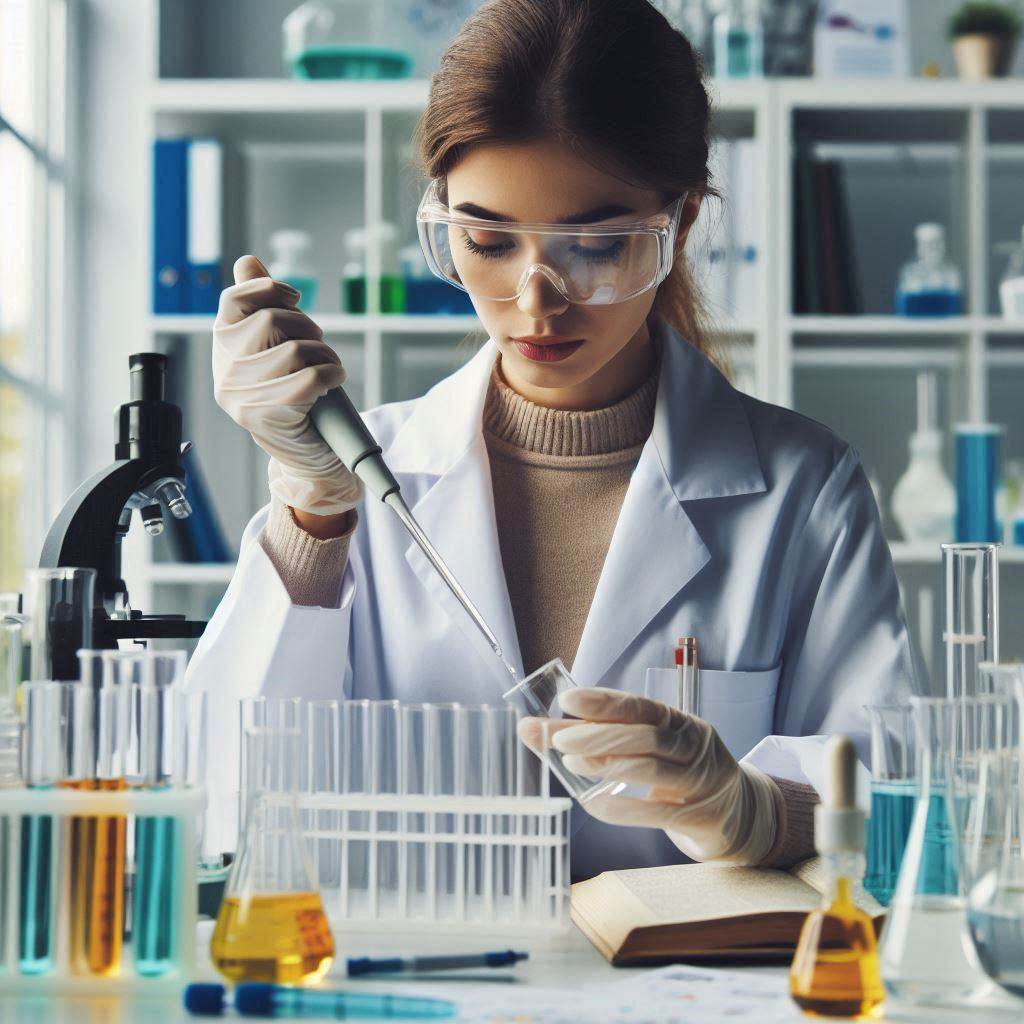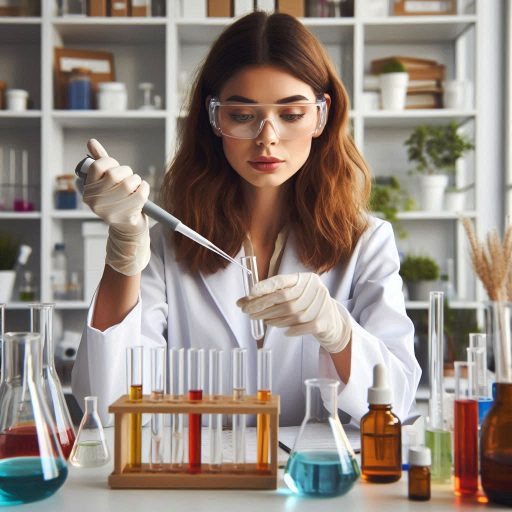Introduction
Overview of What a Laboratory Technician Does
A laboratory technician plays a vital role in various settings, including healthcare and research.
They are responsible for conducting tests, analyzing samples, and ensuring accurate results.
Their tasks include preparing specimens, operating diagnostic equipment, and recording data.
They follow strict protocols and quality standards to maintain the integrity of their work.
Importance of Laboratory Technicians in Healthcare and Scientific Research
In healthcare, laboratory technicians are essential for diagnosing and monitoring patient health.
They perform tests on blood, urine, and other samples, providing critical information for doctors to make informed decisions about treatment and care.
Accurate test results are crucial for effective patient management.
In scientific research, laboratory technicians support experiments and studies by preparing samples, maintaining equipment, and documenting findings.
Their work helps advance scientific knowledge and contributes to technological innovations.
By ensuring precision and reliability in their tasks, laboratory technicians play a key role in both medical and scientific fields, making their contributions indispensable for progress and effective healthcare.
Research and Understand the Role
Learn About the Job Responsibilities and Duties of a Laboratory Technician
To become a laboratory technician, start by understanding the job‘s core responsibilities.
Laboratory technicians work in diverse settings like hospitals, research labs, and pharmaceutical companies.
Their main duties include preparing and analyzing samples, conducting tests, and maintaining laboratory equipment.
Technicians often handle tasks such as measuring and mixing chemicals, operating complex instruments, and recording test results.
They must ensure accuracy in every test and adhere to safety protocols.
Additionally, technicians are responsible for managing inventory and maintaining a clean, organized workspace.
Reviewing detailed job descriptions provides insights into specific responsibilities.
Many technicians also engage in quality control, troubleshooting equipment issues, and assisting in research projects.
Understanding these duties helps in assessing if the role aligns with your career goals and interests.
Understand the Qualifications and Skills Required for the Job
Next, focus on the qualifications and skills necessary for a laboratory technician role.
Typically, a relevant educational background is required, such as an associate’s degree in laboratory technology or a related field.
Some positions may require a bachelor’s degree or specific certifications.
Certification from organizations like the American Society for Clinical Pathology (ASCP) can be advantageous.
It validates your skills and knowledge, increasing your employability.
Many employers also value hands-on experience, which can be gained through internships or entry-level positions.
Key skills for laboratory technicians include strong analytical abilities, attention to detail, and good organizational skills.
Technicians must accurately interpret data, follow protocols precisely, and manage multiple tasks efficiently.
Proficiency with laboratory equipment and techniques is also crucial.
Practical experience enhances your qualifications.
Enroll in accredited programs that offer laboratory practice, and seek internships to gain real-world experience.
Networking with professionals and engaging in industry-specific forums can provide additional insights into skills and qualifications.
By thoroughly researching the role of a laboratory technician, you gain a clear understanding of both the job responsibilities and required qualifications.
This knowledge is essential for pursuing a successful career in this field.
Obtain a High School Diploma or GED
Complete High School Education with a Focus on Science Courses
To become a laboratory technician, begin by completing your high school education.
Focus on science courses to build a solid foundation for future studies.
Courses in biology, chemistry, and physics are particularly relevant.
They introduce fundamental concepts and laboratory techniques that will be crucial in your career.
Excel in science classes to develop a strong grasp of scientific principles and methods.
Engage actively in laboratory experiments and hands-on activities, as these experiences will be valuable in your future role.
Aim for high grades in these subjects to demonstrate your commitment and aptitude for the field.
Participate in any available extracurricular activities related to science.
Join science clubs, participate in science fairs, or seek out volunteer opportunities in laboratory settings.
These activities enhance your understanding of science and provide practical experience.
Ensure a Strong Foundation in Biology, Chemistry, and Mathematics
A strong foundation in biology, chemistry, and mathematics is essential for aspiring laboratory technicians.
Biology and chemistry courses provide knowledge about living organisms and chemical processes, which are integral to laboratory work.
Mathematics is crucial for accurately measuring substances, analyzing data, and performing calculations.
Focus on mastering these subjects during high school.
Take advanced or honors courses if available, as they offer a deeper understanding and prepare you for more complex concepts in higher education.
Developing proficiency in these areas will support your success in technical courses and laboratory training.
Consider additional study resources or tutoring if needed to strengthen your skills in these subjects.
Building a solid academic foundation in biology, chemistry, and mathematics will facilitate your transition to more advanced studies and technical training required for a laboratory technician career.
By completing your high school education with a focus on science courses and ensuring a strong foundation in biology, chemistry, and mathematics, you prepare yourself for further education and training.
This preparation is crucial for succeeding in the competitive field of laboratory technology.
Read: Safety Tips for Field Surveying Technicians
Pursue a Post-Secondary Education
Enroll in a Respected Laboratory Technician Program or Associate Degree in Medical Laboratory Technology
After high school, the next step is to pursue post-secondary education.
Enroll in a reputable laboratory technician program or an associate degree in medical laboratory technology.
These programs provide the specialized knowledge and skills needed for a successful career.
Look for programs accredited by recognized bodies, such as the National Accrediting Agency for Clinical Laboratory Sciences (NAACLS).
Accreditation ensures that the program meets high educational standards and prepares you effectively for certification exams and employment.
During your studies, you will cover essential topics such as hematology, microbiology, clinical chemistry, and immunology.
These courses will deepen your understanding of laboratory practices and prepare you for the technical aspects of the job.
Obtain Hands-On Training in Lab Techniques and Procedures
Hands-on training is a critical component of laboratory technician education.
Choose a program that offers extensive laboratory practice and clinical experience.
Practical training allows you to apply theoretical knowledge to real-world scenarios and develop essential skills.
In the lab, you will learn to operate various instruments, perform tests, and handle samples.
You’ll also gain experience in following safety protocols and maintaining laboratory equipment.
This practical experience is invaluable in preparing you for the demands of the job.
Many programs include clinical internships or externships where you work in actual laboratory settings.
These opportunities provide practical experience and help you build professional connections.
Internships also offer a chance to refine your skills and gain confidence in performing lab procedures.
By enrolling in a respected laboratory technician program and obtaining hands-on training, you position yourself for success in the field.
This education will provide the technical expertise and practical experience needed to excel as a laboratory technician.
Read: Recent Trends in Surveying and Mapping Technologies
Gain Clinical Experience
Seek Internships or Work-Study Programs in Laboratory Settings
To enhance your education and skills, seek internships or work-study programs in laboratory settings.
These opportunities provide valuable hands-on experience and exposure to real-world laboratory environments.
Look for internships offered by hospitals, research facilities, or diagnostic labs.
Internships allow you to apply the knowledge gained from your post-secondary education in a practical setting.
They help you understand the daily operations of a laboratory and gain insights into various lab techniques and procedures.
Work-study programs also offer practical experience while you continue your education, integrating classroom learning with on-the-job training.
Learn from Experienced Technicians and Gain Practical Skills in a Real-World Setting
During your internship or work-study program, focus on learning from experienced laboratory technicians.
Observe their techniques, ask questions, and seek feedback on your work.
Experienced technicians can provide valuable insights into best practices, troubleshooting, and effective laboratory management.
Gaining practical skills is a key benefit of clinical experience.
You‘ll learn how to operate laboratory equipment, perform tests accurately, and handle samples efficiently.
This experience will help you develop a keen eye for detail and improve your ability to follow protocols and maintain high standards of accuracy.
Engage actively in all tasks and take initiative to expand your knowledge.
Use this time to familiarize yourself with the latest technologies and techniques used in the field.
Practical experience in a real-world setting prepares you for the responsibilities of a full-time laboratory technician role.
By seeking internships or work-study programs and learning from experienced technicians, you build a strong foundation of practical skills.
This clinical experience is essential for transitioning from an educational setting to a professional laboratory environment.
Read: Networking Tips for Surveying and Mapping Professionals

Obtain Certification
Consider Obtaining Certification Through Organizations Like the American Society for Clinical Pathology (ASCP) or the National Accrediting Agency for Clinical Laboratory Sciences (NAACLS)
Obtaining certification is a pivotal step in establishing your career as a laboratory technician.
Certification from reputable organizations, such as the American Society for Clinical Pathology (ASCP) or the National Accrediting Agency for Clinical Laboratory Sciences (NAACLS), is often required or highly recommended by employers.
These certifications not only validate your expertise but also enhance your credibility and employability in the field.
The ASCP offers several certification options for laboratory technicians, including the Medical Laboratory Technician (MLT) credential.
This certification signifies that you have met the industry‘s high standards for knowledge and competency.
Similarly, the NAACLS provides certification through its accredited programs, ensuring that you are well-prepared for the responsibilities of a laboratory technician role.
To pursue certification, you must first complete an accredited educational program.
This typically involves earning an associate degree or higher in medical laboratory technology or a related field.
Additionally, gaining clinical experience through internships or work-study programs is crucial, as it helps you apply theoretical knowledge in practical settings.
Each certification body has specific eligibility requirements, which often include a combination of educational qualifications, clinical experience, and successful completion of certification exams.
Research the requirements of each organization to determine which certification aligns with your career goals and aspirations.
The Required Exams to Demonstrate Competency in the Field
Passing the required certification exams is a critical step in demonstrating your competency and readiness to work as a laboratory technician.
These exams assess your knowledge of laboratory techniques, procedures, and safety protocols.
They are designed to ensure that you can perform your job effectively and adhere to industry standards.
Begin your preparation for the certification exams by thoroughly studying relevant materials.
This includes reviewing textbooks, class notes, and any additional resources provided by your educational program.
Many certification bodies offer study guides, practice exams, and online resources to help you prepare.
Consider joining study groups or seeking additional support if needed.
Engaging with peers or mentors can provide valuable insights and help clarify complex concepts.
Practice exams are particularly useful for familiarizing yourself with the format and types of questions you will encounter.
Ensure that you understand the exam format and the types of questions that will be asked.
Certification exams typically include multiple-choice questions, practical scenarios, and case studies.
Being well-prepared will help you approach the exam with confidence and increase your chances of success.
After passing the exams, you will receive your certification, which serves as a formal recognition of your skills and knowledge.
Certification is not only a requirement for many positions but also a testament to your commitment to the profession and your ability to meet high standards.
In summary, obtaining certification through organizations like the ASCP or NAACLS is a crucial step in your career as a laboratory technician.
It involves meeting educational and experience requirements and passing rigorous exams to demonstrate your competency.
This certification will enhance your professional credentials and open up more opportunities in the field.
Read: Field vs. Office Work in Surveying and Mapping
Continue Professional Development
Stay Updated on New Technologies and Advancements in the Field
Continuing professional development is vital for laboratory technicians to remain competitive and effective in their roles.
The field of laboratory technology is constantly evolving, with new technologies and advancements emerging regularly.
Staying updated on these developments ensures that you can adapt to changes and incorporate new methods into your practice.
Begin by regularly reading industry journals, scientific publications, and online resources related to laboratory technology.
These sources often provide information on the latest research, technological innovations, and best practices in the field.
Subscribing to relevant newsletters or following professional organizations on social media can also keep you informed about recent trends and updates.
Engage with professional communities and forums where laboratory technicians and scientists discuss recent advancements.
Participating in these communities allows you to exchange ideas, seek advice, and learn from the experiences of others in the field.
Staying informed about new technologies and methodologies will help you make informed decisions and improve your technical skills.
Attend Workshops, Conferences, and Seminars to Enhance Skills and Knowledge
Attending workshops, conferences, and seminars is an excellent way to enhance your skills and knowledge as a laboratory technician.
These events provide opportunities to learn directly from experts, network with professionals, and explore the latest innovations in laboratory technology.
Workshops often focus on specific skills or techniques, offering hands-on training and practical experience.
They allow you to practice new methods, use advanced equipment, and receive feedback from experienced instructors.
Participating in workshops can help you acquire new competencies and refine your existing skills.
Conferences and seminars typically feature a range of presentations and sessions on various topics relevant to laboratory technicians.
They cover emerging research, industry trends, and new technologies.
Attending these events allows you to gain a broader understanding of the field and stay current with advancements.
Networking at these events is also beneficial.
Connecting with other professionals can lead to valuable collaborations, job opportunities, and mentorship.
Engaging with peers and experts helps you stay informed about industry standards and practices.
Many professional organizations and institutions offer continuing education programs and certification renewals that include workshops and seminars.
These programs often provide credits that contribute to maintaining your certification and demonstrate your commitment to professional growth.
In summary, continuing professional development is essential for laboratory technicians to stay current with advancements and maintain a high level of competency.
Stay updated on new technologies by reading industry resources and participating in professional communities.
Enhance your skills and knowledge by attending workshops, conferences, and seminars, which offer practical training and networking opportunities.
Investing in your professional growth will enhance your career and ensure you remain at the forefront of the field.
Delve into the Subject: Essential Tools and Software for Marine Engineers
Learn More: Chemical Engineering in the Pharmaceutical Industry
Transform Your Career Today
Unlock a personalized career strategy that drives real results. Get tailored advice and a roadmap designed just for you.
Start NowBuild a Strong Network
Connect with Professionals in the Industry Through Networking Events and Online Platforms
Building a strong professional network is essential for advancing your career as a laboratory technician.
Connecting with industry professionals through networking events and online platforms can open doors to new opportunities and provide valuable insights.
Start by attending industry-specific networking events, such as conferences, seminars, and workshops.
These events gather professionals from various sectors of the laboratory field, offering a chance to meet peers, potential employers, and experts.
Engaging in conversations and exchanging contact information at these events can help you establish valuable connections.
Online platforms like LinkedIn are also useful for building a professional network.
Create a comprehensive profile that highlights your skills, experience, and achievements.
Join relevant groups and forums where laboratory technicians and other industry professionals share information and discuss trends.
Actively participating in these groups can help you stay informed and connect with like-minded individuals.
Utilize online networking tools to engage with professionals in your field.
Follow industry leaders, share relevant content, and participate in discussions to enhance your visibility and credibility.
Building a strong online presence can lead to networking opportunities and increase your chances of discovering new career prospects.
Seek Mentorship Opportunities to Learn from Experienced Laboratory Technicians
Mentorship is a valuable component of professional development.
Seeking mentorship opportunities allows you to learn from experienced laboratory technicians and gain insights into the field from a seasoned perspective.
Identify potential mentors within your network or through professional organizations.
Look for individuals who have experience and expertise in areas you are interested in or wish to develop further.
Reach out to them with a respectful inquiry about mentorship, explaining your career goals and how you hope to benefit from their guidance.
A mentor can provide valuable advice on career progression, share practical experiences, and offer feedback on your work.
They can also help you navigate challenges and provide support as you advance in your career.
Building a strong mentoring relationship can provide personalized guidance and help you make informed decisions about your career path.
Participate in mentorship programs offered by professional organizations or educational institutions.
These programs often match you with experienced professionals who can offer structured guidance and support.
Engaging in a formal mentorship program can provide additional resources and opportunities for career growth.
In summary, building a strong network is crucial for career advancement as a laboratory technician.
Connect with professionals through networking events and online platforms to expand your network and stay informed about industry trends.
Seek mentorship opportunities to gain insights and guidance from experienced technicians.
Investing time in networking and mentorship will enhance your career prospects and provide valuable support as you advance in the field.
Apply for Job Opportunities
Prepare a Strong Resume Highlighting Relevant Experience and Skills
When applying for laboratory technician positions, a well-crafted resume is essential.
Your resume should clearly highlight your relevant experience, skills, and qualifications.
Start with a strong summary statement that captures your career goals and key strengths.
Detail your educational background, including any degrees or certifications relevant to the field.
Emphasize any hands-on training, internships, or clinical experience.
Clearly outline your skills, such as proficiency in laboratory techniques, equipment operation, and data analysis.
Use bullet points to list your responsibilities and achievements in previous roles, focusing on how you contributed to your previous employers.
Include any certifications you have obtained, such as those from the American Society for Clinical Pathology (ASCP) or the National Accrediting Agency for Clinical Laboratory Sciences (NAACLS).
These credentials enhance your resume and demonstrate your commitment to professional standards.
Make sure your resume is well-organized, free of errors, and tailored to the specific job you are applying for.
Customize your resume for each position by aligning your skills and experience with the job description.
Research Potential Employers and Apply for Laboratory Technician Positions
Researching potential employers is a critical step in your job search.
Identify organizations that align with your career goals and values.
Consider hospitals, research facilities, pharmaceutical companies, and diagnostic laboratories as potential employers.
Visit company websites to learn about their mission, values, and current job openings.
Look for information about their laboratory practices, work culture, and recent projects.
This research will help you tailor your application and demonstrate that you are a good fit for their organization.
Apply for laboratory technician positions by submitting your resume and a well-written cover letter.
Your cover letter should highlight your enthusiasm for the role, explain why you are interested in the specific employer, and demonstrate how your skills and experience align with the job requirements.
Utilize job search platforms, industry-specific job boards, and professional networks to find job listings.
Follow application instructions carefully and ensure that you meet all requirements before submitting your application.
Prepare for Interviews by Practicing Common Interview Questions and Showcasing Your Passion for the Field
Once you secure an interview, preparation is key to success.
Practice answering common interview questions related to laboratory technician roles.
These questions may cover topics such as your experience with specific laboratory techniques, how you handle challenging situations, and your ability to work as part of a team.
Prepare to discuss your relevant experience and skills in detail.
Be ready to provide examples of how you have applied your technical knowledge in previous roles.
Demonstrate your problem-solving abilities, attention to detail, and commitment to maintaining high standards.
Showcase your passion for the field by expressing enthusiasm for the role and the laboratory environment.
Discuss any relevant projects, research, or experiences that have fueled your interest in laboratory technology.
Your enthusiasm and dedication can set you apart from other candidates.
Conclusion
The Steps to Become a Laboratory Technician
Becoming a laboratory technician involves several essential steps.
Start by earning a relevant degree or diploma in a science-related field.
Next, gain hands-on experience through internships or entry-level positions.
Obtain certification to boost your credentials and job prospects.
Finally, pursue continuous education and training to keep your skills current.
The Importance of Dedication, Education, and Continuous Learning in This Profession
Dedication is crucial in this profession.
It involves a commitment to accuracy, attention to detail, and reliability.
A strong educational foundation is necessary for understanding complex laboratory procedures and techniques.
Continuous learning is vital for staying updated with technological advancements and industry trends.
By following these steps and embracing dedication, education, and lifelong learning, you build a solid career as a laboratory technician.
The combination of these factors ensures you are well-prepared to meet the demands of the profession and excel in your role.
Your commitment to ongoing improvement will set you apart in this dynamic field.
[E-Books for Sale]
The Big Book of 500 High-Paying Jobs in America: Unlock Your Earning Potential
$19.99 • 500 High-Paying Jobs • 330 pages
Explore 500 high-paying jobs in America and learn how to boost your career, earn more, and achieve success!
See All 500 High-Paying Jobs of this E-Book
1001 Professions Without a Degree: High-Paying American Jobs You Can Start Now
$19.99 • 1001 Professions Without a Degree • 174 pages
Discover 1001 high-paying jobs without a degree! Unlock career tips, skills, and success strategies for just $19.99!




